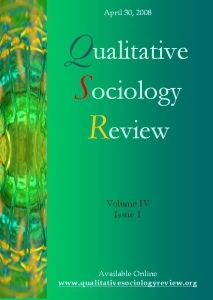The Construction of Self-Identity in the Chronically Mentally Ill: A Focus on Autobiographic Narratives of Mentally Ill Patients in South Korea
DOI:
https://doi.org/10.18778/1733-8077.4.1.08Keywords:
Psychiatry, Chronic mental illness, Autobiographic narratives, Biographical methodsAbstract
A systematic policy for treatment and management of chronic psychiatric patients in South Korea was begun with the passage of the Mental Health Act in 1995. The mentally ill patients who were previously separated from the society now have opportunities to live in local communities under medication with the help of rehabilitation facilities. This study aims to understand how mentally ill patients deal with their new medical environment. An autobiographic narrative analysis is methodically applied in order to link the social and the individual levels. Autobiographic narratives of illness show how the patient’s self-identity is formed and further developed according to the chronic conditions of his illness and the continual learning from experiences. In regard to the construction of selfidentity, two aspects should be taken into consideration: First, medication is absolutely necessary before patients can leave the hospital and participate in rehabilitation programs. Secondly, social integration is usually evaluated by the return of the patient into a normal biographical stage. It turns out that medication deprives the patients of control over their emotions, their bodies. Furthermore, their social environments – including family, friends and the labor market – work against them. Under these circumstances, mentally ill patients are liable to adhere to their own interpretation of mental illness, and what they experience is far different from the expectations of experts in the field. The new mental health environment also contributes to the formation of patient communities. As a result, chronic psychiatric patients are able to build their own subculture and to see themselves through their own eyes. Further studies are needed to explore whether and to what extent the ongoing improvement of social conditions for mentally ill patients has an impact on autobiographic narratives and self-identity construction.
Downloads
References
Angermeyer, Matthias, Michael Beck, Sandra Dietrich and Anita Holzinger (2004) “The Stigma of Mental Illness: Patients’ Anticipations and Experiences.” International Journal of Social Psychiatry 50(2): 153-162.
Google Scholar
DOI: https://doi.org/10.1177/0020764004043115
Bury, Michael (1982) “Chronic Illness as Biographical Disruption.” Sociology of Health & Illness 4(2): 167-182.
Google Scholar
DOI: https://doi.org/10.1111/1467-9566.ep11339939
Bury, Michael (1991) “The Sociology of Chronic Illness: A Review of Research and Prospects.” Sociology of Health & Illness 13(4): 451-468.
Google Scholar
DOI: https://doi.org/10.1111/j.1467-9566.1991.tb00522.x
Bury, Michael (2001) “Illness Narratives: Fact or Fiction?” Sociology of Health & Illness 23(3): 263-285.
Google Scholar
DOI: https://doi.org/10.1111/1467-9566.00252
Giddens, Anthony (1990) The Problems of Modernity. Cambridge: Policy Press.
Google Scholar
Giddens, Anthony (1991) Modernity and Self-Identity. Cambridge: Policy Press.
Google Scholar
Goffman, Erving (1961) Asylums. Garden City, NY: Anchor Books.
Google Scholar
Illich, Ivan (1976) Limits to Medicine: Medical Nemesis, the Expropriation of Health. London: M. Boyars.
Google Scholar
DOI: https://doi.org/10.1097/00004010-197700000-00017
Kern, Thomas and Nam Sang-hui (2005a) “Die Entstehung und Entwicklung des Gesundheitswesens in Südkorea.” Pp.169-192 in Jahrbuch Korea 2005. Politik-Wirtschaft-Gesellschaft, edited by Patrick Köllner. Hamburg: Institut für Asienkunde.
Google Scholar
Kern, Thomas and Nam Sang-hui (2005b) “Gesundheitspolitik für psychisch Kranke seit den 1990er Jahren in Südkorea: Entstehung des psychiatrischen Feldes und seine gesellschaftliche Einbettung.” Pp.193-207 in Jahrbuch Korea 2005. Politik-Wirtschaft-Gesellschaft, edited by Patrick Köllner. Hamburg: Institut für Asienkunde.
Google Scholar
Kleinman, Arthur (1988) The Illness Narratives. New York: Basic Books.
Google Scholar
Korea Association of Community Mental Rehabilitation Centers (2002) Seoulsi sahoe boggwisiseol pyeonggadaehoe [Evaluation Meeting of Community Mental Rehabilitation Centers in Seoul]. Seoul: Taiwha Saemsosneunjib (in Korean).
Google Scholar
Manning, Nick (2000) “Psychiatric Diagnosis under Conditions of Uncertainty.” Sociology of Health & Illness 22(5): 621-639.
Google Scholar
DOI: https://doi.org/10.1111/1467-9566.00223
Ministry of Health & Welfare (1954-1999) Yearbook of Health and Welfare Statistics (in Korean). Seoul.
Google Scholar
Ministry of Health & Welfare (2001) Jeongsinjilhwansiltae yeogsajosa [The Epidemiological Study of Mental Disorder] (in Korean). Seoul.
Google Scholar
Nam, Sang-hui (2001) Jalyowaui daehwa [Dialogue with Data] (in Korean). Seoul: Hanul Publishing Company.
Google Scholar
National Human Rights Commission of Korea (2003) Jeongsinjilhwanjaeui ingwonboholeul uihan chilyohwangyeongsangeui munjejeom [Problems of Treatment Environments for Protecting Human Rights of Psychiatric Patients]. Materials for a Public Inquiry for Protecting Human Rights of Psychiatric Patients (in Korean). Seoul.
Google Scholar
National Seoul Hospital (2002) Guglib-Seoul-byeongwon 2002 nyeon jinlyosiljeog tonggye [The Statistics of Clinical Results in National Seoul Hospital in 2002] (in Korean). Seoul.
Google Scholar
OECD (2002) Review of the Korean Health Care System. Paris.
Google Scholar
Parsons, Talcott (1951) The Social System. London: Routledge and Kegan Paul.
Google Scholar
Parsons, Talcott (1957) “The Mental Hospital as a Type of Organization.” in The Patient and the Mental Hospital, edited by Milton Greenblatt, Daniel Levinson and Richard Williams. Glencoe, IL: Free Press.
Google Scholar
Seth, Michael (2002) Education Fever. Society, Politics, and the Pursuit of Schooling in South Korea. Honolulu, HI: University of Hawaii Press.
Google Scholar
Strauss, Anselm and Barney Glaser (1967) The Discovery of Grounded Theory. San Francisco, CA: University of California Press.
Google Scholar
Strauss, Anselm and Barney Glaser (1975) Chronic Illness and the Quality of Life. St. Louis, MO: C.V. Mosby.
Google Scholar
Strauss, Anselm, Leonard Schatzman, Danuta Ehrlich, Rue Bucher and Melvin Sabshin (1963) “The Hospital and Its Negotiated Order.” in The Hospital in Modern Society, edited by Eliot Freidson. New York: Free Press.
Google Scholar
Szasz, Thomas (1957) Pain and Pleasure: A Study of Bodily Feelings. New York: Basic Books.
Google Scholar
Williams, Gareth (1984) “The Genesis of Chronic Illness: Narrative Reconstruction.” Sociology of Health & Illness 6: 175-200.
Google Scholar
DOI: https://doi.org/10.1111/1467-9566.ep10778250
Williams, Gareth (2003) “The Determinants of Health: Structure, Context and Agency.” Sociology of Health & Illness 25: 131-154.
Google Scholar
DOI: https://doi.org/10.1111/1467-9566.00344
Williams, Simon (2000) “Chronic illness as Biographical Disruption or Biographical Disruption as Chronic Illness?” Sociology of Health & Illness 22(1): 40-67.
Google Scholar
DOI: https://doi.org/10.1111/1467-9566.00191
Yoshida, Karen (1993) “Reshaping of Self.” Sociology of Health & Illness 15(2): 217-245.
Google Scholar
DOI: https://doi.org/10.1111/1467-9566.ep11346888
Downloads
Published
How to Cite
Issue
Section
License

This work is licensed under a Creative Commons Attribution-NonCommercial-NoDerivatives 4.0 International License.











